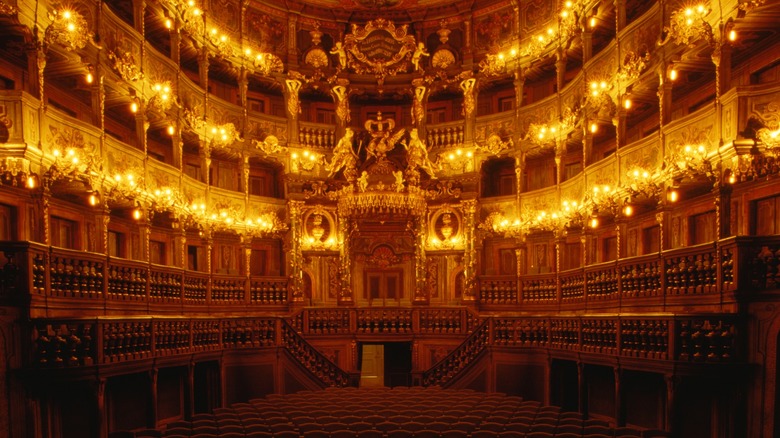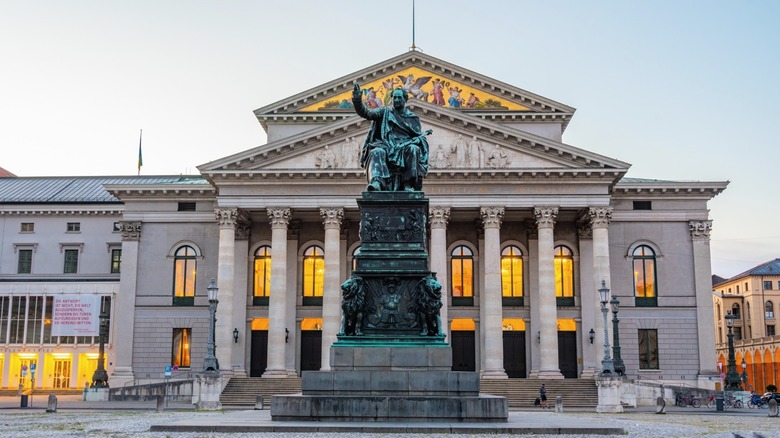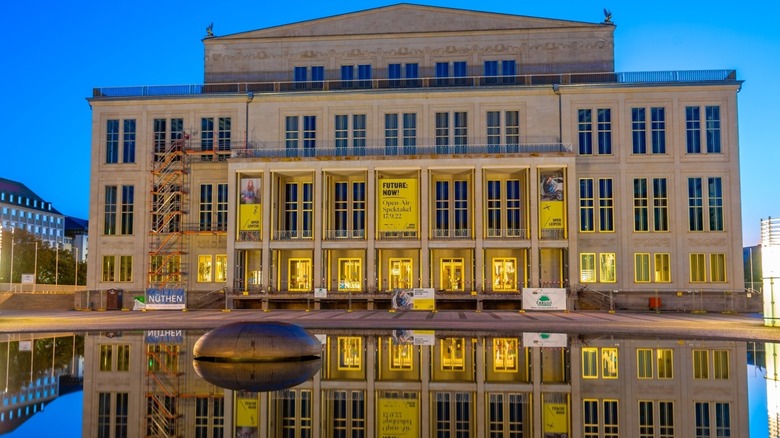The European Country With Some Of The World's Most Incredible Opera Houses
If you're like most creatures of this century, you probably think of opera in the comical stereotypes of buxom ladies and men in leggings bouncing around stages and singing high notes. However, there's one place where the art form is still appreciated as if it were Venice in the 1600s: Germany. With more than 80 opera houses staging a third of total opera performances worldwide, there's no denying that the Germans are big fans of the artform birthed in Italy and popularized in romantic opera halls in Rome and Venice, creating a popular draw long before it was one of the most overtouristed cities in Europe.
Germany's first opera house opened in 1657 in Munich, and since then the German people have become some of the art form's greatest fans and most celebrated composers. Think Mozart, Wagner, Handel, and Strauss, along with a host of other important composers unknown to the casual listener. And with elaborate and often modern stagings of classical as well as contemporary operas, Germany's dozens of stages host something for rabid opera fanatics, casual classical connoisseurs, and even you, the blissfully undiscerning listener. Most opera houses don't even mind if you come dressed in jeans and a t-shirt. There's a lot of opera to see in Germany, and if you see enough of it, maybe you'll just find something to love, too.
Don't miss these heavy-hitting historical opera houses on a visit to Germany
One of the first places any opera enthusiast must visit in Germany is the underrated Bavarian town of Bayreuth, home to storied streets, lush parks, and a thriving music scene. The stunningly ornate wooden Baroque design of its original opera house, the Margravial Opera House at Opernstraße 14 and a UNESCO World Heritage site, is worth a visit even if you can't stand opera. (It's also possible to visit the historical site on a tour.) Commissioned at the behest of Margravine Wilhelmina in 1748, the building was seen as too small and too fancy by composer Richard Wagner when he thought of staging an opera festival in the city. He built his own stately, massive opera house, the Bayreuther Festspielhaus, which hosts a festival of his work every year and makes the city of 75,000 rich with operatic opportunity.
Munich's contribution to the opera scene and the operatic home of Wolfgang Amadeus Mozart, the Bayerische Staatsoper, on Max-Joseph-Platz 2, is a stately venue with Corinthian columns and grand halls. Walking in almost feels like entering a temple or cathedral, but that doesn't stop the venue from hosting the dramatic, enigmatic, and sometimes racy operas for which the artform is known! Test your stamina by attending the summertime open-air operas in front of the building, which are free.
And of course, no tour of Germany's historical opera houses would be complete without visiting Berlin's Staatsoper Unter den Linden on Unter den Linden 7, the opera house that was built as part of Prussian King Frederick II's transformative plan for the city in 1741. The opera house that was in its day the largest in Europe hosted the likes of Richard Strauss and Leo Blech as conductors. Today, it's one of three opera houses in Berlin.
Opera houses built in the 20th century have intriguing highlights
Berlin's two modern opera houses are welcome additions to the layered German opera scene. The Komische Oper on Bismarckstraße 10 hosts cabaret and musical-theater style shows in alternation with the 'operetta' style of lighthearted, innovative, socially-conscious operas. And in the former West Berlin, the Deutsche Oper on Richard-Wagner-Straße 10, is home to intriguing stagings and modern, avant-garde operas that remind visitors why Berlin is a city best explored after dark.
In perhaps an ode to opera's Venetian roots, it was Germany's "Venice of the North," Hamburg, that became home to the first privately-held German opera house in 1678. The Staatsoper Hamburg distinguishes itself by commissioning new operas and staging classics from German and Italian composers every year at Große Theaterstraße 25. Attend a behind-the-scenes tour to hear some of the stories of its history and some of its first musicians, like George Frideric Handel, who staged his first opera there.
Located in one of Germany's most renowned cities of music and the hometown of composer Richard Wagner, Oper Leipzig was founded in 1693. Today, the (newer) building on Augustusplatz 12 displays the lush, state-sanctioned glamor of 1950s East Germany, with its high socialist realist architecture, clean lines, and symphony of browns – just one of the perks of visiting a less-crowded, underrated eastern German city. Performances here and in the neighboring East German city of Dresden at the SemperOper (Schinkelwache, Theaterplatz 2) honor hometown hero Wagner as well as other classic Italian and German composers.


